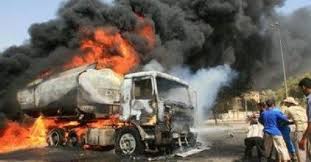
The devastating explosion of a commercial vehicle on the Abeokuta-Sagamu Interchange Expressway, which claimed 16 lives, is yet another grim reminder of the dangers posed by the unsafe transportation of flammable materials. Governor Dapo Abiodun’s call for transport unions to educate their members on these risks is both timely and necessary. However, given the frequency of such tragedies, a more robust approach is needed—one that includes stricter enforcement of regulations, comprehensive safety training for drivers, and the introduction of safer transport alternatives for hazardous substances.
Recent events across Nigeria highlight the urgency of addressing this issue. In September 2024, a fuel tanker explosion in Niger State resulted in 52 fatalities, while another disaster in Jigawa State the following month claimed over 200 lives. In January 2025, a similar explosion in Suleja, Niger State, killed 98 people. A common and tragic pattern in these incidents is the public’s tendency to rush to accident scenes to scoop fuel, often resulting in mass casualties when the spilled fuel ignites.
Despite repeated warnings and government interventions, the problem persists due to lax enforcement, poor public awareness, and the absence of stringent transportation protocols. The Nigerian government recently established a high-powered committee, including the National Emergency Management Agency (NEMA) and the Petroleum Tanker Drivers Association, to investigate these incidents and implement preventive measures. Additionally, President Bola Ahmed Tinubu has directed the National Orientation Agency (NOA) to intensify awareness campaigns on the dangers of fuel scooping.
While these efforts are commendable, they must be complemented by practical steps at the state and local levels. Ogun State, like many other states, must introduce policies that require commercial transporters handling hazardous materials to undergo mandatory safety training and certification. There should also be designated routes and specific timeframes for transporting flammable goods, reducing the likelihood of accidents occurring in densely populated areas.
Furthermore, transport unions such as the National Union of Road Transport Workers (NURTW) and the Road Transport Employers Association of Nigeria (RTEAN) must take proactive measures. Educating drivers on the risks associated with carrying flammable substances and ensuring that only roadworthy vehicles are used for such transportation will go a long way in preventing further tragedies.
Beyond government action and transport unions’ responsibilities, individuals must also take safety seriously. Public awareness campaigns should not only focus on discouraging fuel scooping but also on educating people about the inherent dangers of proximity to flammable cargo. Media outlets, religious institutions, and community leaders must play a crucial role in reinforcing these messages.
As Governor Abiodun rightly stated, passenger safety must be prioritised. The repeated loss of lives in preventable accidents should serve as a wake-up call for all stakeholders. Without immediate and decisive action, Nigeria risks witnessing more needless deaths caused by the reckless transportation of hazardous materials. The time for change is now.
Kindly share this news!!!